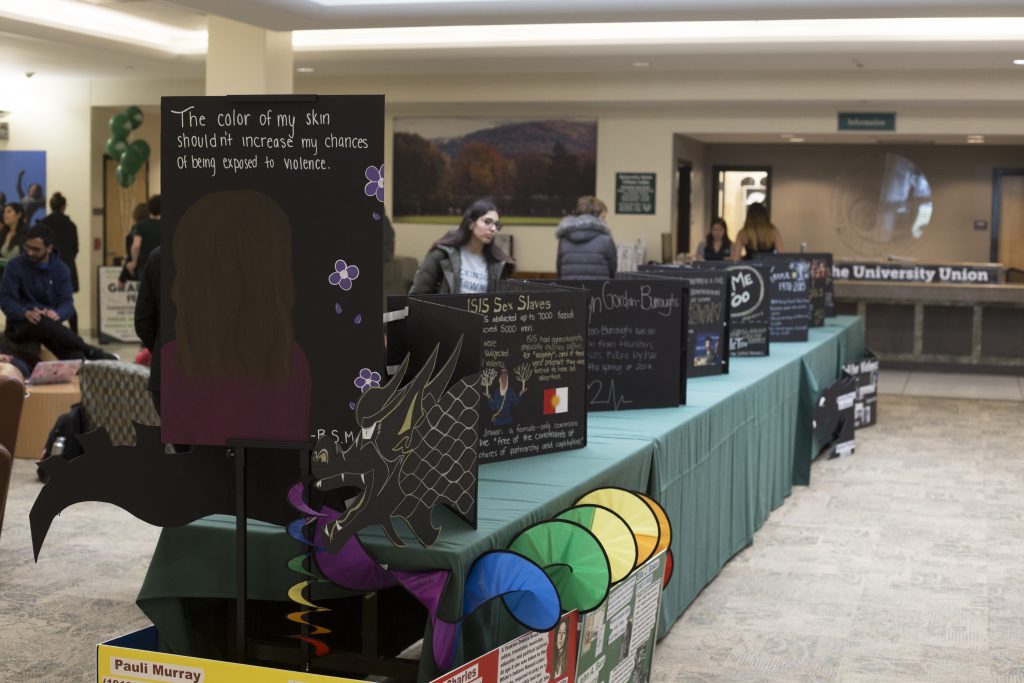This week, the Dragon Panel Project debuted on campus to honor women of color who have faced interpersonal, political and hate violence. The project is an art installation that aims to raise awareness for this growing international issue, prompting Binghamton University students to share stories of violence victims who might not have a voice.
BU is one of the first colleges to participate in the project. It was founded by Rachel Carey-Harper, a visual artist who advocates for the safety of women. She also founded the Clothesline Project, a popular visual project used by many colleges including BU, to raise awareness for domestic violence.
20:1 Prevention Programs (20:1), Real Education About College Health (REACH), Mental Health Outreach Peer Educators (M-HOPE), the Multicultural Resource Center (MRC), the Q Center and other student groups helped create the panels, which were hooked together to form a different dragon at each location the project was displayed. Health Promotion and Prevention Services, 20:1, the MRC and the Q Center sponsored the Dragon Panel Project.
The project usually looks at interpersonal violence on a national scale, but Mackenzie White, a 20:1 intern and a junior majoring in nursing, said BU expanded the project to recognize victims beyond America.
“We’ve taken it and evolved it to make it more of a global take,” White said. “We think it’s really important that you’re not just looking at this nationally, but that you’re seeing that this is also a global issue we’re facing.”
The panels consisted of black foam boards which featured a woman or a group of women of color to honor those who have died due to interpersonal violence. They included pictures of victims, statistics about missing and murdered women and powerful phrases and quotes written in metallic marker.
Alfi Amin, a 20:1 intern and junior majoring in psychology, said the process of creating the panels was an emotional experience.
“Every case had so much detail to it, and not being able to write everything, since the panels had to be condensed, was hard, because I thought everything was equally important for people to know,” she said. “Also, it was very content heavy. It was really sad to read some of the panels, and I carried that emotion with me for the whole day when I read about it.”
White said she had a similar experience.
“You’re in a creative process, so you’re excited about what you’re doing, you’re having a good time, and then you sit down and you realize what you’re creating and that you’re writing something so somber and something so horrific that happened to someone,” she said. “It was a very humbling experience and a balance of that creative side and also respect that we wanted to show for these women of color.”
The panels are featured at the University Downtown Center (UDC), the School of Pharmacy and Pharmaceutical Sciences (SOPPS), Glenn G. Bartle Library and the Tillman Lobby in the University Union.
White said the locations of the panels were intentional so a diverse group of students could view them.
“There was a great emphasis on where this project was going to be set up because we wanted it to hit as many different groups of Binghamton students as possible,” she said. “I think it’s important because Binghamton has seen its own versions of violence and violence against women. It’s on every college campus, this climate of dating violence that goes wrong.”
The project is on display from Tuesday, April 2 to Thursday, April 4 at various locations on campus. The UDC also hosted an opening reception Wednesday evening, which introduced the project and discussed its aim to raise awareness. Carey-Harper spoke at the reception and visited campus on Wednesday to view the project.
White said she hopes people take the project seriously and connect with the stories shared through the panels.
“I think that it should almost be treated as a vigil experience,” she said. “It should definitely be taken in as a moment of silence. It should be something that stops and interrupts you and puts you in a place that’s different. We just hope that people do take the time and do show the respect that these survivors and victims deserve.”
Amin said she hopes the project will expand to more colleges so it can influence the younger generations.
“I think this is a good platform to talk about it so people actually learn more about forms of assault and fight against it,” she said. “We’re also the young generation who are pretty much future leaders, and if we are educated about it, it ensures that the future generations will also care about it.”



